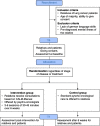Effectiveness of structured psycho-oncological counseling for relatives of lung cancer patients based on the CALM approach-study protocol of a randomized controlled trial
- PMID: 38336739
- PMCID: PMC10858519
- DOI: 10.1186/s13063-024-07954-9
Effectiveness of structured psycho-oncological counseling for relatives of lung cancer patients based on the CALM approach-study protocol of a randomized controlled trial
Abstract
Background: The high incidence combined with the high lethality and bad prognosis of lung cancer highlight the need for psycho-oncological care for both patients and their relatives. While psychological interventions for relatives might be helpful, further research on the impact of specific interventions is necessary. Therefore, this trial aims to evaluate structured psycho-oncological counseling for relatives of lung cancer patients based on the Managing Cancer And Living Meaningfully (CALM) approach compared to usual care. In addition, we explore the impact of psycho-oncological support of relatives on the patients' mental health outcomes.
Methods: The study is a single-center, prospective, randomized controlled trial with two measurement time points. Relatives of lung cancer patients and, thus, the patients themselves (i.e., dyads) are randomly allocated to the intervention group (IG) or the control group (CG) regardless of their disease or treatment stage. Relatives in the IG receive structured counseling based on the CALM approach (three to six sessions with psycho-oncologists). The CG receives usual psycho-oncological care. In addition, cancer patients in both study arms can request psycho-oncological support (usual care) as needed, but they will not get a specific intervention. Relatives and patients complete assessments at baseline (T0) and after the intervention/6 weeks (T1). The primary outcome for relatives is anxiety. Relatives' secondary outcomes include depressive symptoms, distress, supportive care needs, and quality of life. Patients' outcomes include anxiety, depression, and distress. All outcomes are assessed using self-report validated questionnaires. Intervention effects will be evaluated using analysis of covariance (ANCOVA) adjusting for baseline values. Power calculations reveal the need to enroll 200 subjects to detect an effect of d = 0.4.
Discussion: The study will provide evidence for the effectiveness of the CALM intervention in relatives of lung cancer patients. Furthermore, study results will contribute to a better understanding of the effectiveness of a psycho-oncological intervention for highly impaired cancer patients and their relatives. If the CALM intervention positively affects the relatives' psychosocial outcome, it may be implemented in routine care.
Trial registration: German Clinical Trials Register DRKS00030077. Retrospectively registered on 26 October 2022.
Keywords: CALM; Counseling; Family care; Lung cancer; Oncology; Psycho-oncology.
© 2024. The Author(s).
Conflict of interest statement
The authors declare that they have no competing interests.
Figures
Similar articles
-
Efficacy of a brief manualized intervention Managing Cancer and Living Meaningfully (CALM) adapted to German cancer care settings: study protocol for a randomized controlled trial.BMC Cancer. 2015 Aug 19;15:592. doi: 10.1186/s12885-015-1589-y. BMC Cancer. 2015. PMID: 26286128 Free PMC article. Clinical Trial.
-
Integrated, cross-sectoral psycho-oncology (isPO): a new form of care for newly diagnosed cancer patients in Germany.BMC Health Serv Res. 2022 Apr 22;22(1):543. doi: 10.1186/s12913-022-07782-0. BMC Health Serv Res. 2022. PMID: 35459202 Free PMC article.
-
An emotion-based online intervention for reducing anxiety and depression in cancer patients: Study protocol for a randomized controlled trial.Internet Interv. 2021 Jun 8;25:100410. doi: 10.1016/j.invent.2021.100410. eCollection 2021 Sep. Internet Interv. 2021. PMID: 34401369 Free PMC article.
-
Telephone interventions for symptom management in adults with cancer.Cochrane Database Syst Rev. 2020 Jun 2;6(6):CD007568. doi: 10.1002/14651858.CD007568.pub2. Cochrane Database Syst Rev. 2020. PMID: 32483832 Free PMC article.
-
Behavioural modification interventions for medically unexplained symptoms in primary care: systematic reviews and economic evaluation.Health Technol Assess. 2020 Sep;24(46):1-490. doi: 10.3310/hta24460. Health Technol Assess. 2020. PMID: 32975190 Free PMC article.
References
-
- Cancer in Germany 2017/2018. 13th edition. Robert Koch Institute (ed.) and the Association of Population-based Cancer Registries in Germany (ed.). Berlin: Robert Koch Institute; 2022. Available from: https://www.krebsdaten.de/english.
-
- Barnes B, Kraywinkel K, Nowossadeck E, Schönfeld I, Starker A, Wienecke A, et al. Bericht zum Krebsgeschehen in Deutschland 2016. Robert Koch-Institut; 2016. 10.17886/rkipubl-2016-014.
Publication types
MeSH terms
LinkOut - more resources
Full Text Sources
Medical
Research Materials


